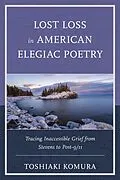Lost Loss in American Elegiac Poetry: Tracing Inaccessible Grief from Stevens to Post-9/11 examines contemporary literary expressions of losses that are "lost" on us, inquiring what it means to "lose" loss and what happens when dispossessory experiences go unacknowledged or become inaccessible. Toshiaki Komura analyzes a range of elegiac poetry that does not neatly align with conventional assumptions about the genre, including Wallace Stevens's "The Owl in the Sarcophagus," Sylvia Plath's last poems, Elizabeth Bishop's Geography III, Sharon Olds's The Dead and the Living, Louise Glück's Averno, and poems written after 9/11. What these poems reveal at the intersection of personal and communal mourning are the mechanism of cognitive myth-making involved in denied grief and its social and ethical implications. Engaging with an assortment of philosophical, psychoanalytic, and psychological theories, Lost Loss in American Elegiac Poetry elucidates how poetry gives shape to the vague despondency of unrecognized loss and what kind of phantomic effects these equivocal grieving experiences may create.
Autorentext
Toshiaki Komura is associate professor of English at Kobe College.
Inhalt
Introduction
Chapter 1: Wallace Stevens's Elegiac Mode: Creating Fictions of Loss
Chapter 2: Sylvia Plath's Poems of 1963: Dysthymia and Subterranean Loss
Chapter 3: Elizabeth Bishop's Geography III: Unlosing Lost Loss
Chapter 4: Sharon Olds's The Dead and the Living: Distant Loss and Ethical Empathy
Chapter 5: Post 9-11 Elegiac Poetry: the Unsaid
Conclusion & Afterword: Lost Loss beyond American Elegiac Poetry
Acknowledgments
About the Author
Index
